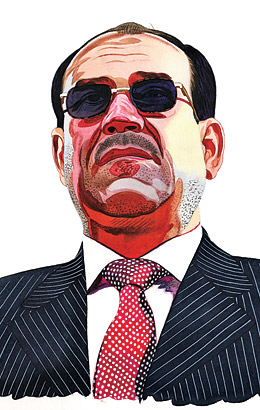
Nouri al-Maliki is the first Iraqi Prime Minister to hold office under the new constitution. He spent most of his prior life as an Islamic Dawa Party activist working for Saddam's overthrow. Dawa, long years of exile and the fight against Saddam shaped al-Maliki and his worldview.
Al-Maliki, 58, assumed his role at a time when violence was high. The bombing of al-Askari Mosque in February 2006 was intended to cause an all-out war between Shi'ites and Sunni Arabs. During those tense times, I met with al-Maliki often. I found him to be focused on establishing security but torn on some key issues. He understood the need for reconciliation with former Baathists but was concerned that they would conspire to return to power. He told me he opposed the militias, but he was loath to move against the powerful Jaish al-Mahdi (JAM) because its political wing had supported his bid for office and because he believed it protected Shi'ites against Sunni attacks.
The evolution in al-Maliki's performance as Prime Minister surprised many. He became committed to building a new Iraqi state. His decision to use force against JAM in Basra in March 2008 — when he took charge of the operation himself — was a defining moment. Al-Maliki has skillfully maintained good relations with both the U.S. and Iran and handled Iraqi political groups well.
When I had dinner with him in Baghdad recently, I found him to be more at peace with himself, more confident that Iraq will succeed. But he and his nation face challenges. Iraq needs further progress in reconciliation. Violence could increase again. Kurds and the al-Maliki government need to avoid a drift toward increased tensions. And there has been little progress toward realizing Iraq's enormous economic potential. All these challenges will tax al-Maliki's political skills and determine his place in Iraqi history.
Khalilzad is a former U.S. ambassador to the U.N., Iraq and Afghanistan